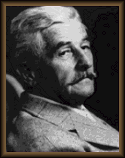

1) See if you can figure out who is the "we" of the narrator? Why
do you think the narrator uses "we" instead of "I"?
2) Faulkner would be very upset if you didn't have to use the dictionary at
least once a story. He liked to make readers stretch themselves. So don't worry
if there are lots of words you don't know. But I've started you with a list
to check before you start. Vocabulary: cupolas, obliterated, august, coquettish,
perpetuity, deputation, temerity, diffident, deprecation, lime (not the fruit),
jalousies, cabal, circumvent, impervious, sibilant, macabre, acrid, pall, valance,
cuckold, inextricable.
1) Can you reconstruct a chronological list of events?
2) What details foreshadow the conclusion of the story? Are you shocked by the
ending?
3) Explain Emily's relationship to the town and the people. What does the narrator
mean by "Alive, Miss Emily had been a tradition, a duty and a care"?
4) What do you think is the significance of the title?
5) What does Emily and her family represent for the townspeople and the narrator?
6) What values does the narrator appear to hold? Are there points in the story
where he offers his own commentary?
7) Explain how Emily's reasons for murdering Homer are related to her personal
history and to the ways she handled previous conflicts.
Faulkner on the Web: http://www.mcsr.olemiss.edu/~egjbp/faulkner/faulkner.html
William Faulkner Foundation: http://www.uhb.fr/faulkner/WF/index.htm
Center for Faulkner Studies: http://www2.semo.edu/cfs/homepage.html
Teaching Faulkner Newsletter Archives: http://www6.semo.edu/cfs/teaching_faulkner.htm
William Faulkner's Centenial Page by Random House Publishers: http://www.randomhouse.com/features/faulkner/
Lesson Starts! ![]() BACK
TO INDEX
BACK
TO INDEX